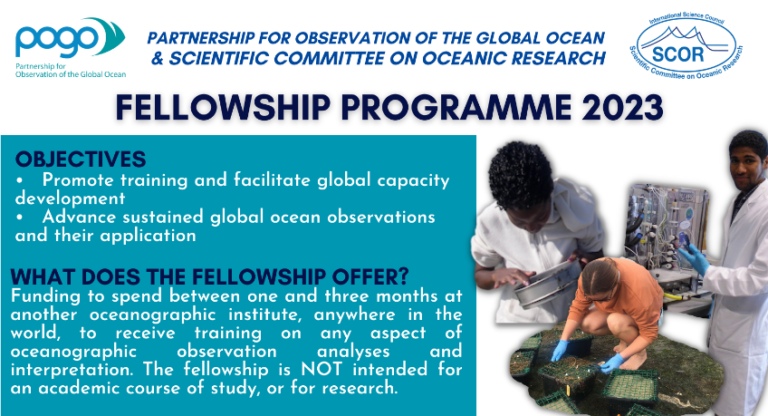Deadline: May 15, 2023
Applications are open for the POGO-SCOR Fellowship Programme 2023. This programme is jointly funded by POGO and the Scientific Committee on Oceanic Research (SCOR) and is designed to promote training and capacity building leading towards a global observation scheme for the oceans. The Programme has been a success for around 20 years, with 190 fellowships awarded since 2001.
The main purpose of the program is to advance sustained ocean observations and their applications. Priority is given to applicants in early stages of career development. This fellowship is intended to support training in oceanographic observations, not to learn research techniques. Its main purpose is to advance sustained ocean observations and their applications; it offers the opportunity to visit other oceanographic centres for a short period (1 to 3 months) for training on any aspect of oceanographic observations, analyses, and interpretation.
Cost
The following costs are covered by the program:
- International airfare
- Transport from airport to host institute
- Contribution towards living expenses
Eligibility
- Open to scientists, technicians, postgraduate students (preferably of PhD level) and post-doctoral fellows of developing countries and countries with economies in transition and involved in oceanographic work.
- Applicants must be citizens of developing countries or economies in transition, as defined by the Development Assistance Committee (DAC) of the OECD.
Selection Criteria
The Selection Criteria involve a number of factors including:
- Quality of the application;
- Relevance of the application to the priority areas identified in the Fellowship Announcement (Emerging and low-cost technologies for ocean observations; Physical, biological and biogeochemical sensors on floats and gliders; Floating litter observations and modelling; Open and coastal ocean observation, modelling and management; Data management & time series analysis; Underwater sound, acoustic observations and modelling; Optical measurements of living and non-living particles; Fixed-point time-series observations (e.g. contributing to OceanSITES, OBIS, IODE Ocean Data Portal, WOD and/or other shared data systems); Large-scale, operational biological observations including biomolecular and biodiversity (e.g. biological EOVs, CPR, OBON and other programmes));
- Evidence that the training will lead to capacity-building with potential lasting impact on regional observations; and,
- The need to maximise regional distribution of the awards.
Application
Documents you will need to upload to the application portal:
- proposal form (use template provided)
- flight quotation evidence (e.g., screenshot of airline website, travel agency quotation)
- parent supervisor recommendation letter
- host supervisor acceptance letter
For more information, visit POGO-SCOR Fellowship.

